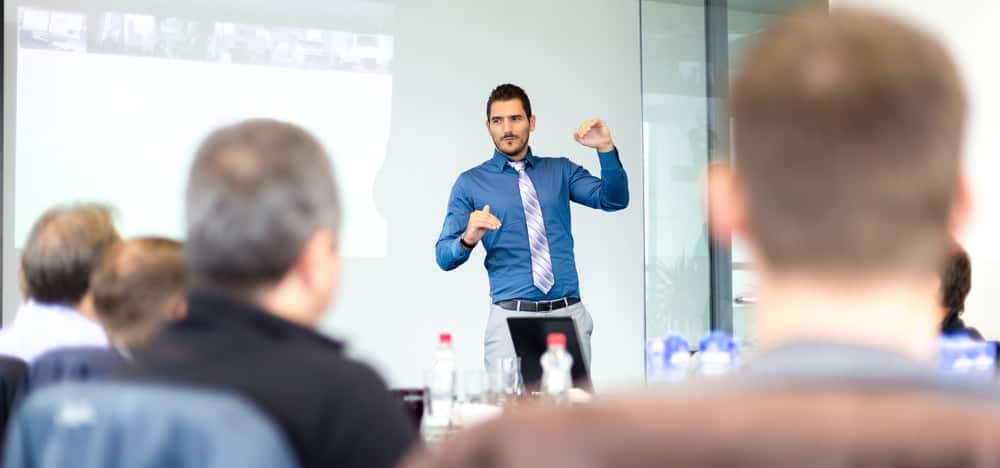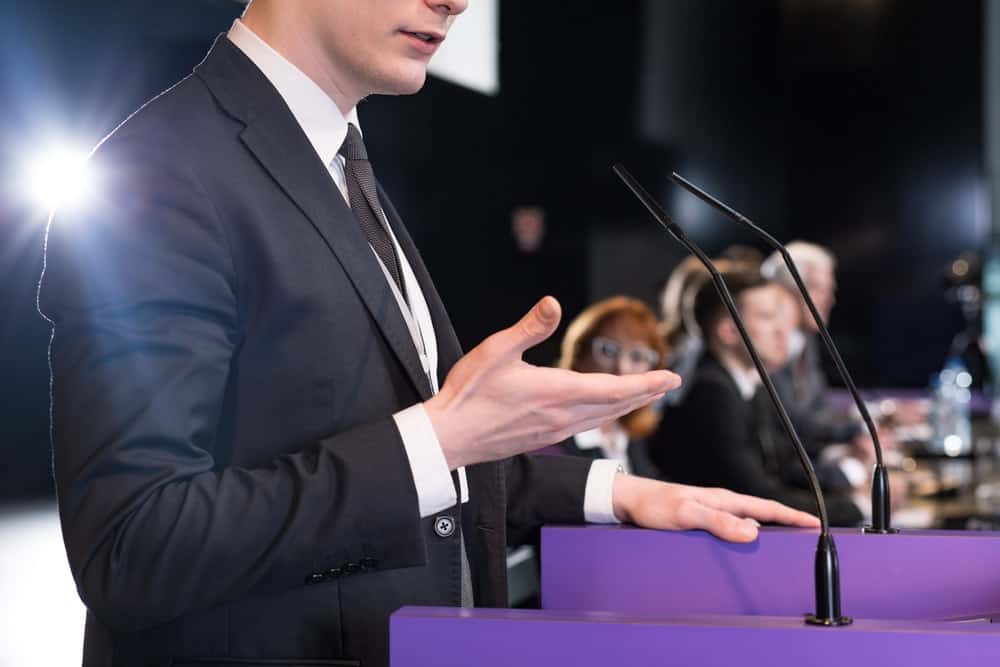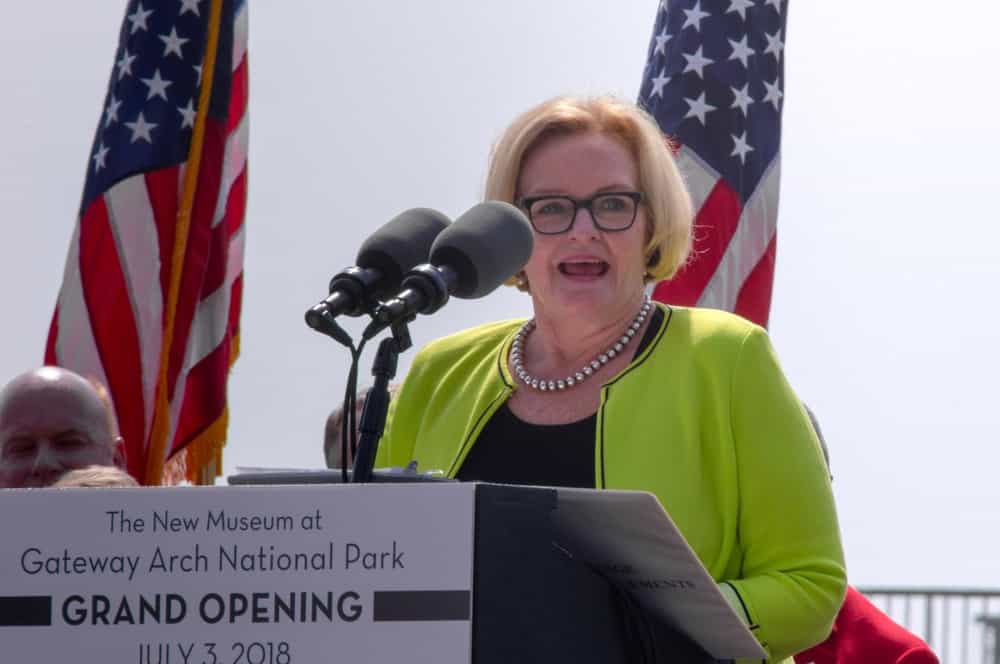9 Different Types of Speeches (Plus Tips and Examples for Each)

One of the most famous speeches is Dr. Martin Luther King’s “I Have a Dream.” It was delivered 55 years ago in Washington D.C. to an estimated 250,000 people who showed up in support of civil rights.
People might have never heard of the speech had the sound system not been fixed promptly. It was discovered that someone had sabotaged the sound system just before the event started.
As shown by Dr. King, speeches are powerful and can be used to move mountains. That’s why it’s important to know the different types of speeches and how you can harness them to your advantage.
Basic Types of Speeches
Demonstrative Speech

The purpose of a demonstrative speech is to educate the audience on something. It can include visual aids that add to the demonstration and describe in practical terms how to do something. Demonstrative speeches are similar to informative speeches but informative speeches normally do not include actual demonstrations.
If you give a talk on how to start a blog, how to write a cover letter, or even how to make money on the Internet, these can be considered demonstrative speeches. Asking yourself “how” and “why” questions is a great way to get this type of speech started and, of course, visual aids are a necessity for any type of demonstrative speech or presentation.
Entertaining Speech

If you’ve ever been to a wedding reception or banquet — and who hasn’t? — you are already familiar with an entertaining type of speech. The main purpose of a best man’s speech or an after-dinner speaker is to entertain the crowd and most speakers do that through illustrations, funny stories, and basic humor. Entertaining speeches are informal and usually very short; they are speeches that provide a lot of enjoyment and pleasure for the audience.
Informative Speech

People who give informative speeches are there to present the audience with new information on a particular subject. They present statistics and facts about topics such as social and economic changes in the community but they do not use visual aids in the speech.
Instead, they rely on educational information, facts, and various data so that the audience actually learns something. If you’ve ever been to a museum and had a tour guide, you’ve enjoyed the benefits of an informative speech. Any time that a talk is given to give the audience details and information on a certain topic, this is an example of an informative speech.
Persuasive Speech

Persuasive speeches are there to persuade the audience that an opinion expressed by the speaker is the right one. Whether you’re discussing what to eat for supper or which political point makes the most sense, these are examples of persuasive speeches. Most people, in an attempt to persuade the audience that their point of view is the right one, use solid facts to back up their argument. This is one of the best ways to make sure that your persuasive speech does the trick, which means that using research and statistics to develop your argument is always more likely to make people come to your side.
Other Types of Speeches
Oratorical Speech

Oratorical speeches are delivered in the style used by an orator. Its name is a little redundant because “orator” and “oratorical” both relate to the giving of speeches. These types of speeches are usually given at a special celebration such as an inauguration or ribbon-cutting ceremony. They can be long and formal, such as speeches used at a graduation, funeral, or inauguration, or short and informal, such as speeches delivered as toasts at special events.
Oratorical speeches can also be given at events such as birthday parties, going-away parties, retirement parties, and many others. Political speeches are usually considered oratorical speeches and they are better when they do not try and settle a complex argument but instead when they appeal to common virtues and basic truths. In oratorical speeches, the speaker is not trying to persuade someone to do something or believe a certain way but even though they are fairly general in purpose, the speaker can still address certain issues while giving the speech. Inauguration speeches are perhaps the most well-known oratorical speeches that exist today.
Special Occasion Speech

Speeches that don’t fall into any other category are usually classified as special occasion speeches and these can include speaker introduction speeches, designed to be short but interesting and to introduce an upcoming speaker; tribute speeches, which are designed to pay tribute to someone either dead or alive; and award acceptance speeches, which are meant to thank someone for an award and describe what the award means to you.
Special occasion speeches are designed to be short, usually ten minutes or less; succinct and to the point; and mood-setting. In other words, there are distinct purposes for special occasion speeches and whether the event they’re offered at includes something that is happy or somber, for someone still living or a posthumous occasion, or something large or small, they are often some of the easiest speeches to write. Most often, speeches for special occasions are fun and upbeat and if you research them online, it is easy to find out how to get started for your own special occasion speech.
Motivational Speech

A motivational speech is a unique type of speech and has the goal of self-improvement for the audience members. With a motivational speech, you can turn a negative situation into a positive one. These types of speeches are especially popular in business meetings with executives, to complete a certain task, or to encourage employees to sell more of your product or service. Motivational speeches can be found in elementary school to high school in order to motivate the students to do better on a test or in a sporting event. The speeches are great for inspiring people, lifting a person’s self-esteem, or even motivating an entire crowd of people.
Motivational speeches often use techniques to make the speeches more effective. These include:
- Starting with an activity –g., a breathing exercise — to demonstrate what the speaker’s goals are and which results are expected in the end
- Asking a question in order to pique the audience’s curiosity and interest
- Quoting a scientific study so that your motivational speech has some authority and trust
- Telling a story to get the audience more interested and involved; this can include a historical story, a personal story, or even a professional story, although a story from your own life is likely to work best
- Making sure that you address the audience’s problem so that you can then give them detailed suggestions on what can solve that problem, which will naturally increase their motivation
Debate Speech
-

In a formal debate, much verbal sparring is experienced and the debates come in various forms as well. These forms include Parliamentary, classical, extemporaneous, Lincoln-Douglas, impromptu, public forum, and mock trials, to name a few. As a general rule, in a debate, both sides get equal time to discuss the issue and explain why their view of the issue is the right one. Debates are somewhat different than persuasive speeches because you aren’t necessarily there to get the other side to switch to your side; instead you are there, in essence, to justify why you believe a certain thing.
-
Debates are arguments that have rules and regardless of which style you choose, each side receives the topic then has a certain amount of time to prepare to present it. Debate teams develop very valuable skills, including research skills, public speaking skills, leadership skills, initiative skills, developing grace under pressure, critical thinking skills, and developing arguments that are both logical and sound. Debaters also learn to think on their feet, which is why many people who join debate teams during high school and college go on to become professional mediators or lawyers.
Forensic Speech
-

-
The term “forensic speech” merely refers to the practice and study of debate and public speaking. This is according to the American Forensic Association and this activity is practiced by millions of high school and college students each and every year. The reason why it is called forensics is that this practice is patterned after the competitions at public forums during the period of ancient Greece.
The speeches can take place inside a classroom, a national or international tournament, or even a regional event. During the activity, students learn to research and speech skills in order to learn all different types of speeches. Forensic speeches allow students to perfect their craft under the supervision of experienced public speakers and it can even be considered a type of “on-the-job training” because the students involved in this activity are continuously honing their craft while practicing it at the same time.
- To read the next article Tips to improve speeches, FOLLOW me.
Enjoyed this article? Stay informed by joining our newsletter!













You must be logged in to post a comment.